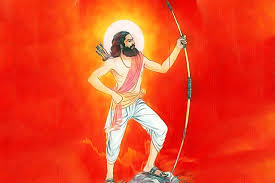Alluri Sitarama Raju

- 09 Jul 2025
In News:
During the 128th birth anniversary celebration of Alluri Sitarama Raju, the Union Defence Minister lauded his valiant role in India’s freedom movement. The Minister also reiterated the government’s commitment to ending Maoist extremism by August 2026.
Alluri Sitarama Raju
- He was a revolutionary figure revered for leading a tribal resistance against British colonial authority. Although he did not belong to a tribal community himself, he championed the cause of indigenous people, earning their deep respect and admiration.
- He was born on 4 July 1897 in Mogallu village, near Bhimavaram, located in present-day Andhra Pradesh. His revolutionary activities were concentrated in the Eastern Ghats’ Agency areas of the state.
Historical Context
- Early Life and Spiritual Turn: After receiving basic education in his village and later in Visakhapatnam, Alluri chose a life of renunciation around the age of 18. As a sanyasi, he traversed forested and hilly regions, developing a close bond with tribal communities.
- Gandhian Influence and Shift to Armed Struggle: Initially influenced by Mahatma Gandhi’s Non-Cooperation Movement, he urged tribal people to disengage from colonial institutions. However, disillusioned by the ineffectiveness of non-violence in protecting tribal rights, he resorted to armed rebellion.
- Role in the Freedom Struggle
- The Rampa Rebellion (1922–1924): Alluri became the face of the Rampa Rebellion, launched in protest against the Madras Forest Act, 1882, which curtailed traditional tribal practices like Podu cultivation and led to forced displacement. Additionally, tribals were subjected to unpaid labour for constructing colonial infrastructure, fueling widespread anger.
- Guerrilla Tactics and Resistance: Raju organized tribal youth into a guerrilla army that attacked British police outposts, looted weapons, and eliminated British officers, causing considerable concern for the colonial administration.
- Martyrdom: His growing influence and success made him a prime target for the British, who announced a ?10,000 bounty for his capture. He was eventually apprehended through deception and executed on 7 May 1924, reportedly tied to a tree and shot dead.
Legacy
- Revered as “Manyam Veerudu” or the Hero of the Jungle, Alluri’s life epitomizes courage and sacrifice.
- The Government of Andhra Pradesh commemorates July 4 as a state festival in his honour.
- He remains a powerful symbol of tribal resistance and justice in India's freedom narrative.
